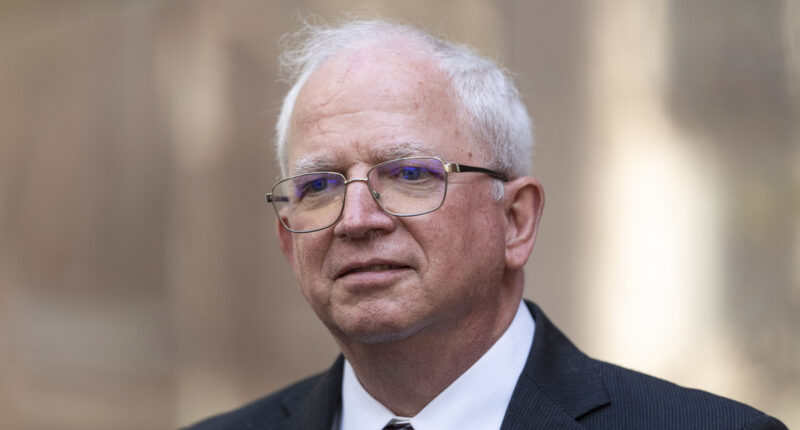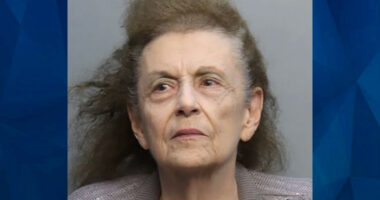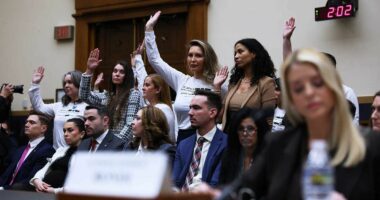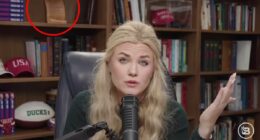Share this @internewscast.com
FILE – Attorney John Eastman, known for crafting a legal plan intended to keep former President Donald Trump in office, speaks to the media after a hearing in Los Angeles on June 20, 2023 (AP Photo/Jae C. Hong, File).
John Eastman, a conservative lawyer, is urging California’s top court to halt ongoing disbarment proceedings related to his involvement in attempts to reverse the 2020 presidential election results to benefit President Donald Trump.
On Monday, Eastman’s legal representatives submitted a 66-page petition for review to the California Supreme Court, requesting the justices to oversee the final stages of this contentious case and overturn a prior disbarment recommendation from a lower court.
The filing openly criticizes the State Bar of California’s actions against the pro-Trump attorney based on his legal services for both the 45th and 47th presidents.
“While the Bar asserts that all lawyers should be allowed to exercise their professional discretion and ethical responsibilities without fear of retaliation,” the petition states. “It simultaneously aims to disbar Dr. Eastman for doing precisely that. This is the epitome of hypocrisy and contradicts the fair administration of justice.”
In June, a three-judge panel from the California State Bar Court’s Review Department — functioning as an appellate court within California’s extensive lawyer disciplinary system — upheld a March 2024 decision advocating for Eastman’s disbarment.
Earlier this month, bar attorneys asked the court to affirm that early summer ruling – and they also asked for a bit more. The bar’s petition took issue with the standard of review and some ancillary conclusions reached by the intermediate court, complaining those decisions could complicate efforts to use the Eastman case as precedent.
In his own petition, Eastman focuses on what he considers significant deficiencies at both the trial court and review stage – more or less eliding the arguments raised by the bar in mid-September.
Chief among Eastman’s complaints is an argument that the reviewing court “misapplied controlling First Amendment precedent.”
“The ‘First Amendment protects the freedom of expression of all citizens, including lawyers,'” the Eastman petition argues – citing several pieces of case law. “Although those rights are minimally circumscribed for attorneys when necessary to protect the administration of justice.”
Such a curtailing of speech rights, however, occurred in Eastman’s case when the lower courts found the attorney “culpable” on several counts against him “for pure political speech that had nothing to do with any judicial proceeding,” the petition argues. The filing goes on to say several free speech-based defenses were similarly nixed.
Those decisions are in direct contravention of precedents issued by the nation’s high court in a 2018 case about content-based regulations on medical speech by anti-abortion pregnancy centers and a 1991 case about attorney comments during a press conference.
“Even when a lawyer comments on a pending matter, the Supreme Court has held that such speech is fully protected absent a ‘substantial likelihood of materially prejudicing’ the proceeding, and outside that courtroom-adjacent context, sanction is permissible only upon a ‘clear and present danger’ to the administration of justice.”
A secondary argument offered by Eastman in his review petition is that the lower courts impermissibly paraphrased him in order to find that he made “intentionally false statements.”
“Eastman did not make intentionally false or even grossly negligent statements, thus he cannot be disciplined for them, even under the Review Department’s misapplication of the First Amendment,” the petition goes on.
To hear Eastman tell it, the appellate court drew inferences in favor of bar counsel – while it was required to draw them in his favor.
One of many cited examples is an instance when the appellate court “itself recognized” bar counsel “falsely asserted” Eastman claimed “there was ‘massive evidence’ of fraud.” Rather, Eastman notes, he said there was “massive evidence that this election was at least conducted illegally” and in “violation of the state statutes.”
The petition goes on to note that Eastman marshaled some 50-plus examples of “violations of state election codes” and that he also relied on various reports issued by the first Trump White House and numerous experts to reach his conclusions.
The upshot of this decision-making process, and the precise way it was phrased, is Eastman’s statements were “tenable, or at the very least not knowingly or grossly false,” according to the petition.
The heart of the filing is a broadside argument that bar authorities – and the courts that ruled in their favor – attacked lawyer who represented a client merely for their unpopular opinions and esteem.
From the petition, at length:
The prosecution of Dr. Eastman by the Bar in this intensely political case is unprecedented. The Review Department recommended he be disbarred for his exercise of his constitutionally-protected rights to speech and to petition the government for redress of grievances, and for his representation of a client, the President of the United States, who is singularly unpopular with Democrats – of which the Hearing Department and [bar counsel] are all affiliated. Perhaps not surprisingly (though certainly wrongly), the Hearing Department’s conduct of the trial was demonstrably biased, in violation of Due Process, and inferences by both the Hearing and Review Departments were drawn against rather than in favor of Dr. Eastman, as the law requires.
“Review by this Court is therefore warranted and, after the independent review of the record that is required, the recommendation of disbarment should be rejected,” the petition concludes. “Any other result would be antithetical to the core of the legal profession and the rule of law.”
Both the bar’s and Eastman’s filings are discretionary. Upon the Review Department’s ruling, the case was automatically filed with the California Supreme Court – giving each party 60 days to file a petition. Had neither party filed such a petition, the intermediate ruling would have been finalized. Eastman, for his part, asked the state supreme court for additional time to file and was granted a reprieve.
















